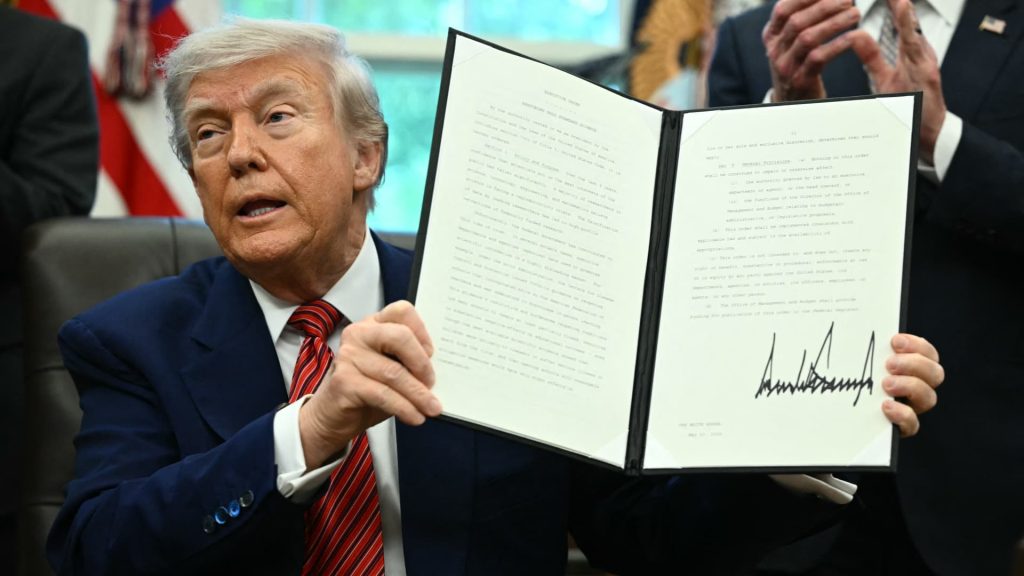US President Donald Trump signs executive orders in the Oval Office of the White House in Washington, DC, on May 23, 2025.
Mandel Ngan | Afp | Getty Images
President Donald Trump signed a series of executive orders on Friday to overhaul the Nuclear Regulatory Commission and speed the deployment of new nuclear power reactors in the U.S.
The NRC is a 50-year-old, independent agency that regulates the nation’s fleet of nuclear reactors. Trump’s orders call for a “total and complete reform” of the agency, a senior White House official told reporters in a briefing. Under the new rules, the commission will be forced to decide on nuclear reactor licenses within 18 months.
Trump said Friday the orders focus on small, advanced reactors that are viewed by many in the industry as the future. But the president also said his administration supports building large plants.
“We’re also talking about the big plants — the very, very big, the biggest,” Trump said. “We’re going to be doing them also.”
Nuclear executives joined Trump for the signing ceremony, including Constellation CEO Joe Dominguez. Constellation is the largest operator of nuclear plants in the U.S. Nuclear stocks rallied Friday in response to the president’s actions.
NRC overhaul
When asked whether NRC reform will result in staff reductions, the White House official said “there will be turnover and changes in roles.”
“Total reduction in staff is undetermined at this point, but the executive orders do call for a substantial reorganization” of the agency, the official said. The orders, however, will not remove or replace any of the five commissioners who lead the body, according to the White House.
Any reduction in staff at the NRC would come at time when the commission faces a heavy workload. The agency is currently reviewing whether two mothballed nuclear plants, Palisades in Michigan and Three Mile Island in Pennsylvania, should restart operations, a historic and unprecedented process.
U.S. President Donald Trump listens as Joseph Dominguez, President and Chief Executive Officer of Constellation, speaks in the Oval Office on the day Trump is expected to sign executive orders, at the White House in Washington, D.C., U.S., May 23, 2025.
Kent Nishimura | Reuters
Dominguez said the nuclear industry’s biggest problem has been regulatory delay. Constellation is aiming to bring the Unit 1 reactor at Three Mile Island back online in 2028 after it closed for economic reasons. A separate reactor, Unit 2, was the site of a partial meltdown at Three Mile Island in 1979.
“We’re wasting too much time on permitting and we’re answering silly questions, not the important ones,” the Constellation CEO said.
Trump’s orders also create a regulatory framework for the Departments of Energy and Defense to build nuclear reactors on federal land, the administration official said.
“This allows for safe and reliable nuclear energy to power and operate critical defense facilities and AI data centers,” the official told reporters. The NRC will not have a direct role, as the departments will use separate authorities under their control to authorize reactor construction for national security purposes, the official said.
Boost uranium mining
The president’s orders also aim to jump start the mining of uranium in the U.S. and expand domestic uranium enrichment capacity, the official said. Trump’s actions also aim to speed up reactor testing at the Department of Energy’s national laboratories.
Investment in nuclear power is growing in the U.S. after a long period of financial turmoil for the industry, including the shutdown of a dozen reactors in recent years as the industry struggled to compete against cheap and abundant natural gas.
The cooling towers of the Three Mile Island nuclear power plant in Middletown, Pennsylvania, Oct. 30, 2024.
Danielle DeVries | CNBC
Building new nuclear plants in the U.S. is notoriously slow and expensive. The two new reactors that recently came online at Plant Vogtle near Augusta, Georgia took seven years longer-than-planned to build, and came in $18 billion over budget.
But the computer technology industry is now driving the revival in nuclear as it races to meet growing electricity demand from data centers used to drive artificial intelligence. Three Mile Island is expected to return to service with financial support from Microsoft, for example, and Alphabet and Amazon are investing in small, advanced reactors.

